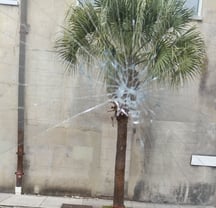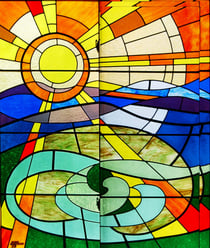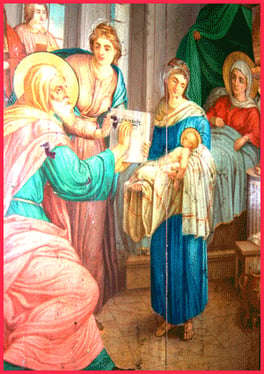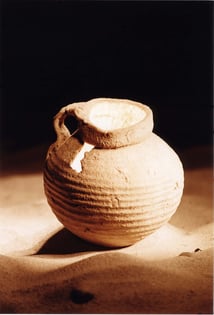 My meditation on the "dawn breaking upon us" began when someone broke three of our book center windows.
My meditation on the "dawn breaking upon us" began when someone broke three of our book center windows.
This third week of Advent I am meditating on the theme “broken.” My meditation began when someone broke three of our windows at two-thirty in the morning. Woken by the sound of windows breaking one after another, I flew open my sash, but not for St. Nick. I hoped to see the perpetrator.
Unable to see anything from the top floor I woke up another sister. We went down to see if our windows that were damaged. Since the alarm didn't go off, we thought it may have been a neighbor’s windows. Then we saw the broken glass on the outside of our double-pane windows. After this I couldn't get back to sleep. My thoughts drifting to the word broken, I remembered the words of the poet Alice Walker, “It is through that broken window that we see the world.”
Zachariah got it. As soon as he could speak again he praised God’s coming as the dawn breaking upon us. I pray Zachariah's canticle every morning during the Liturgy of the Hours (Luke 1:78). These very words are now a part of my response to broken things. It is the tenderness of our God that breaks through our darkness, shattering the barriers between us. Advent celebrates God's very breaking into our life. Our everyday brokenness is transformed by God’s tender light shining through the cracks of broken dreams, broken promises, and broken relationships. Through these openings of the heart God becomes flesh in us.
I have a memory that puts broken glass and tenderness in the same context. As a teenager I watched my brothers and sisters while mom went out shopping. One such day, while I was immersed in reading, I heard the sound of glass falling and breaking over and over again. I ran to the kitchen. My five you old year brother was standing on the counter in front of the cabinet where mom stored her best glasses. The doors to the cabinet were wide open. He climbed with the help of a chair, using shelf after shelf to pull himself up. Each time he did this the shelf tipped sending glass after glass crashing onto the counter. Every effort he made to stand brought down a new shelf. When I arrived he was still and silent while glasses continued rolling out of the cabinet breaking all around him. The best wine glasses, the guest glasses, the dessert glasses, the wedding gift glasses – none were spared. I walked over, arms extended, to pull him from the broken pieces without harm. Carefully lifting him I confidently told my now tearful brother, “It is OK. Mom always says we are more important than anything else.” This was a truth I could rely on. Mom reinforced it. When she head the news she only asked "How are you?"
The poet C. JoyBell C. writes, “We all have cracks and tears and shattered glass within our souls. Some have more than others. We do not wish to seek one who has none; but we wish to find the one who can say ‘look at me, look at this.’ We wish to find the one who sees every bit of broken glass and who will put those pieces into the palms of our hands and say ‘please keep them.’ And we wish to be that kind of person, too. This is how it should be.”
We seek the one who picks us up out of brokenness and says, “I love you. You are most important.” This message we share during Advent becomes “a light shining in a dark place, until the day dawns and the morning star rises in all hearts” (Cf. 2 Peter 1:19). During Advent we wait for this dawn to break upon us, to waken us from our sleep (as it did mine two-thirty in the morning!). “O Oriens,” we pray the O'Antiphon, “O Radiant Dawn, splendor of eternal light, sun of justice: come, shine on those who dwell in darkness and the shadow of death (Cf. Isaiah 9:1).[1]
Our life of faith needs Advent. We need to be reawakened to the full significance of the new life manifested to us in Jesus and our call to be transformed into another Christ. This transformation is so profound and total that it breaks open the “old man” to allow the new person to emerge (Romans 6:6; Ephesians 2:15; 4:22-24; Colossians 3:9-11). For St. Paul this means recognizing our brokenness and accepting our weakness, so that God’s strength is revealed (2 Cor. 12:10). We realize that we need to rely on the tender compassion of our God to guide our feet into the way of peace. God takes our broken glass to make of us a beautiful stain-glass window for divine light to shine through.
 God takes our broken glass to make of us a beautiful stain-glass window for divine light to shine through.
God takes our broken glass to make of us a beautiful stain-glass window for divine light to shine through.
It is consoling to know that “God uses broken things. It takes broken soil to produce a crop, broken clouds to give rain, broken grain to give bread, broken bread to give strength. It is the broken alabaster box that gives forth perfume. It is Peter, weeping bitterly, who returns to greater power than ever” (Vance Havner). Our finest hour comes when we are weak, when we are surrounded by broken glass, transparent in our longing for Jesus to come. We can then be lifted up and told, “You are most important and I came to show you this.” This, Richard Rohr encourages, is “The Church, as Jesus seems to be defining it, the gathering of accepted brokenness. It’s not the gathering of the saved.” Munia Khan expresses it this way, “Wish I could be a fragile piece of glass to accept my brokenness.”
When God breaks in to our lives we can no longer deny our brokenness and we recognize the relation of the divine order to the fallen world where we live. We open our mind, will, and heart to the loving, healing, transforming power of the Holy Spirit until Christ is born in us (Gal. 2:20). Come, Lord Jesus!
The O Antiphons refer to the seven antiphons that are recited (or chanted) preceding the Magnificat during Vespers of the Liturgy of the Hours. They cover the special period of Advent preparation known as the Octave before Christmas, Dec. 17-23, with Dec. 24 being Christmas Eve and Vespers for that evening being for the Christmas Vigil. Each one highlights a title for the Messiah and refers to the prophecy of Isaiah concerning the coming Messiah: O Sapientia (O Wisdom), O Adonai (O Lord), O Radix Jesse (O Root of Jesse), O Clavis David (O Key of David), O Oriens (O Rising Sun), O R
ex Gentium (O King of the Nations), and O Emmanuel.
Copyright 2014, Sr. Margaret Kerry, fsp
About the Author

Sr. Margaret Kerry, fsp
A Daughter of St. Paul for 40 years Sr. Margaret continues to pursue new ways to proclaim the Gospel: sharing the Pauline Charism with the laity, writing books (St. Anthony of Padua: Fire & Light; Strength in Darkness: John of the Cross; Prayers for the New Evangelization), & through direct evangelization. She is available for workshops on the Vocation & Mission of the Laity, Media Literacy, and The New Evangelization. mkerry@paulinemedia.com




.png?width=1806&height=731&name=CatholicMom_hcfm_logo1_pos_871c_2728c%20(002).png)
Comments